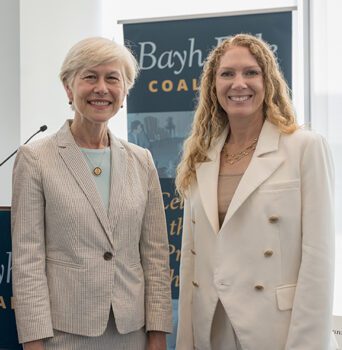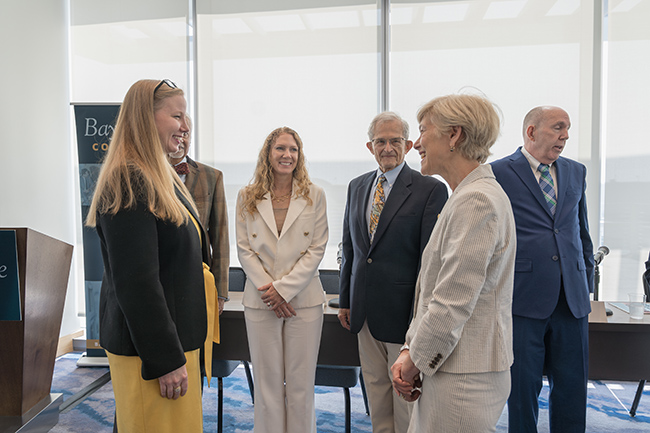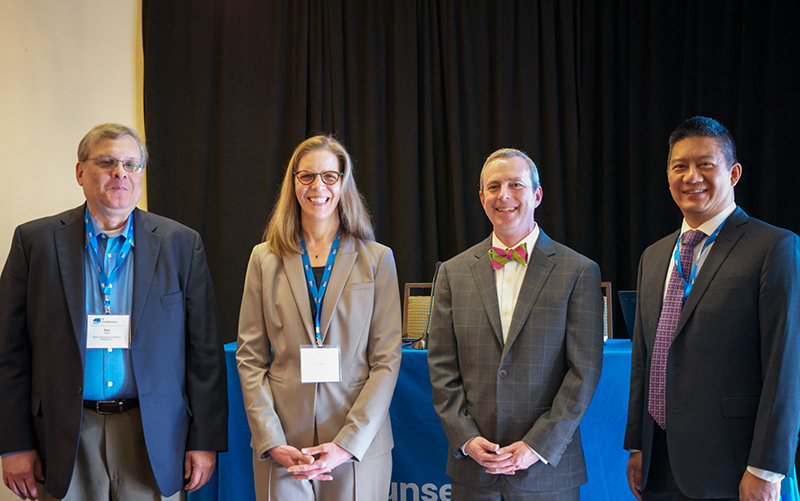Forty-five years ago, the Bayh-Dole Act enabled greater public-private partnership, supercharging U.S. innovation and helping make America a leader in biotech.
The Bayh-Dole Coalition was created with the dual purpose of celebrating the Act’s contribution to innovation and protecting its goals. The Coalition tackled both aspects of this mission during June 4-5, with an awards ceremony and a day of advocacy on Capitol Hill.
The Bayh-Dole Act stipulates that inventions created with the benefit of federally funded research can be patented for private commercialization. Allowing private ownership of the intellectual property enables the investment that brings new ideas to market, so people can benefit from these innovations.
Since its passage in 1980, the Bayh-Dole Act has enabled remarkable innovations in many fields—particularly in biopharma, one of the most research-intensive industries.
“The Bayh-Dole Act has indisputably helped the U.S. life sciences sector become the envy of the world. Over 200 drugs and vaccines have been developed through the kinds of public-private partnerships that Bayh-Dole incentivizes,” according to Lita Nelsen, former director, MIT Technology Licensing Office.
“From 1996-2020, the innovation system created by Bayh-Dole bolstered U.S. economic output by up to $1.9 trillion, supported 6.5 million jobs, and helped lead to more than 17,000 start-up companies,” says a statement from the Bayh-Dole Coalition, whose membership includes innovation-oriented groups like the Biotechnology Innovation Organization (BIO).
Bayh-Dole Coalition Executive Director Joe Allen, who helped develop the Act as a congressional staffer 45 years ago, puts it in human terms:
“There are many people alive today who would not be alive without Bayh-Dole,” he says.
To ensure continued innovation, the Bayh-Dole Coalition works to promote appropriate policy. Recently this has meant preventing misuse of the law for drug price controls and opposing burdensome new rules that could interfere with the commercialization of innovation that the law is meant to enable.
2025 Award winners
A June 4 ceremony was held to give the Coalition’s annual Innovator Awards to five creative people whose achievements are detailed in the 2025 Faces of American Innovation report. The event also featured participation from leaders who can impact policy, including a speech from Coke Morgan Stewart, Acting Under Secretary of Commerce for Intellectual Property and Acting Director of the USPTO; a Q&A with Rep. Deborah Ross (D-NC); and virtual remarks from Sen. Thom Tillis (R-NC).
This year’s winners:
Dr. Jennifer Pagán, founder and CTO of Aquisense, invented a non-toxic, energy-efficient disinfection device using UV light to make water safe to drink. Her technology is now used widely, including aboard the International Space Station.

During the following day’s meetings on Capitol Hill, Rep. Ross, who is from North Carolina’s Research Triangle just like Pagán, engaged with the award winner in a conversation about the importance of innovation, according to Allen.
“Rep. Ross was clearly pleased to speak with a woman innovator from North Carolina and made a point of showing Jennifer that she wasn’t just going through the motions the day before, she really cares about this issue,” Allen says.
Dr. Mark Rohrbaugh, former director of the National Institutes of Health (NIH) Office of Technology Transfer, stood up for the Bayh-Dole Act through periods of intense political pressure. He helped ensure that it could continue to provide breakthroughs that benefit patients.
“This is the first time we honored a federal employee,” Allen says. “If Mark had caved, or NIH had caved, the whole system would have collapsed. Mark worked under Democratic and Republican administrations and explained to each of them how the law works.”
Dr. Jim Dahlberg, emeritus professor at the University of Wisconsin-Madison and cofounder of Third Wave Technologies, discovered an enzyme that detects genetic variations. His breakthrough is used in diagnostic tests for diseases like colorectal cancer, cystic fibrosis, and human papillomavirus (HPV).
Dahlberg’s path to commercialization was unusual because it was the first time University of Wisconson licensed a startup, and the university agreed to take equity instead of charging a licensing fee—an entirely new approach facilitated by Bayh-Dole, according to Allen. “Stanford would use the same formula when spinning out Google to two young students,” Allen says. “In both cases, that worked out very well for the universities as the companies became very successful.”
Vinit Nijhawan, managing director of MassVentures and former head of Boston University’s Office of Technology Development, has had an impactful career, turning academic research into successful startups and helping drive America’s entrepreneurial and technological growth.
Dr. Christina Wildfire, a researcher at the National Energy Technology Laboratory, developed a microwave-based recycling device that converts plastics, waste, and greenhouse gases like CO₂ into usable energy.
Allen spoke during the ceremony to thank the award-winners for employing the concepts behind Bayh-Dole to achieve positive results.
“I told these innovators: We had a theory about how to put innovation to work for society’s benefit, you showed that theory works,” Allen said.
Bringing policy concerns to Capitol Hill
On June 5, the day after the award ceremony, the Bayh-Dole Coalition brought the conference participants to Capitol Hill for policy-oriented discussions. The briefing began with remarks from Rep. Kevin Kiley (R-CA) and featured an opportunity to address policy concerns with 15-20 members of Congress.
“We’re targeting members of Congress and committees that really have oversight on patenting and research funding, people who are going to have an impact on our future,” Allen explains. “We want to make sure they recognize the value of this bill and that they keep it being useful.”
One of the major concerns of the Bayh-Dole Coalition is the counter-productive concept of using “march-in rights,” for drug-price controls. Under the Bayh-Dole Act, if the patent holder of a drug developed with federal support does not commercialize the drug, the government can “march-in” and give the patent to someone else.
The law only allows “march-in” under limited circumstances, like a public health crisis, and the NIH has never used march-in rights, maintaining it is not for price controls. But under the Biden Administration, the National Institute of Standards and Technology (NIST) submitted a framework to consider whether march-in rights could be used to take away patent rights when the price of a drug is deemed too high.
“In our conversations with lawmakers on Capitol Hill, we explained that the march-in framework has not yet been repealed, and it needs to be officially halted,” Allen says.
Other concerns of the Bayh-Dole Coalition were highlighted in a March 14 letter to President Trump outlining “several federal agency-level actions taken in the final days of the Biden Administration that clearly violate” a Feb. 19 Executive Order on government efficiency and deregulation.
Among the five instances cited was one about the NIH under President Biden issuing “licensing guidelines requiring industry licensees to submit continuous and burdensome access planning reports on their commercialization plans,” according to the letter. The guidelines would allow NIH to use this information to revoke licenses after a product is developed—a direct violation of the Bayh-Dole Act, the letter notes.
During their Capitol Hill visit, the Coalition members reiterated that letter’s warning of problematic actions left over from the previous administration.
“Our message to Republicans is that they need to talk to the White House about turning back these measures,” Allen says. “They’re creating a lot of uncertainty—and uncertainty is the enemy of innovation.”
Pictured at top: Coke Morgan Stewart, Acting Under Secretary of Commerce for Intellectual Property and Acting Director of the USPTO, left, speaks with Rep. Deborah Ross (D-NC) as the award winners look on.




